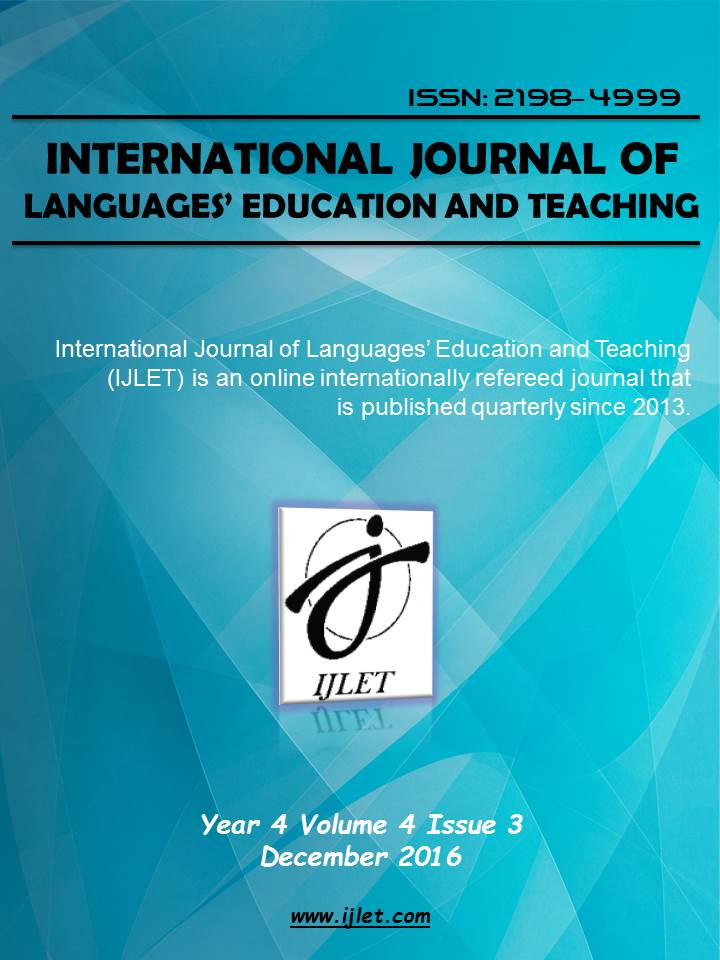The Effect of Cooperative and Individualistic Games on Word Spelling: A Study of Young Iranian EFL Learners
Author :
Abstract
This study builds on the instructional effectiveness and efficiency of two game approaches on word spelling of EFL beginners. The approaches under study were cooperative approach and individualistic approach. The participants of this study consisted of 59 fifth and sixth grade students from two elementary schools in the same district in Firoozeh, Neyshabur- Iran. They received 90 minutes instruction per week for a total of ten sessions in two groups of cooperative and individualistic. The results of the study indicated that there is not a significant difference between the performance of learners in cooperative and individualistic groups. A questionnaire was also given to the learners at the end in order to measure learners' attitude toward the games. The results showed that there is not a big difference between students' attitude toward learning spelling in cooperative group and individualistic group, and both groups have positive attitude toward the games. The researcher concluded that the combination of these two approaches seems more favorable.
Keywords
Abstract
This study builds on the instructional effectiveness and efficiency of two game approaches on word spelling of EFL beginners. The approaches under study were cooperative approach and individualistic approach. The participants of this study consisted of 59 fifth and sixth grade students from two elementary schools in the same district in Firoozeh, Neyshabur- Iran. They received 90 minutes instruction per week for a total of ten sessions in two groups of cooperative and individualistic. The results of the study indicated that there is not a significant difference between the performance of learners in cooperative and individualistic groups. A questionnaire was also given to the learners at the end in order to measure learners' attitude toward the games. The results showed that there is not a big difference between students' attitude toward learning spelling in cooperative group and individualistic group, and both groups have positive attitude toward the games. The researcher concluded that the combination of these two approaches seems more favorable.
Keywords
- Altenmöller, E. M. (1987). Quizzes for teaching to promote spontaneous oral skills. Stuttgart: Klett.
- Bean, W., & Bouffler, C. (1987). Spell by writing. Rozelle, Australia: Primary: English Teaching Association.
- BearD. R., Invernizzi, M., Templeton, S., & Johnston, F. (2000). Words their way: Word study for phonics, vocabulary, and spelling instruction. Columbus, OIR Merrill.
- Benito, J. s., Dreke, M. & Oberberger, C. S. (1997). Spielend Deutsch lernen: Interaktive Arbeitsblätter für Anfänger und Fortgeschrittene. Berlin: Langenscheidt.
- Cohen, L., Manion, L., & Morrison, K. (2007). Research methods in education (6th Ed.). London: Routledge.
- DfES. (2007). Letters and Sounds: Principles and Practice of High Quality Phonics. London: DfES.
- Dryden, G., & Vos, J. (1997). The Learning Revolution. Auckland: The Learning Web.
- Fulk, B. M, & Stormont-Spurgin, M. (1995). Spelling interventions for students with disabilities: A review. The Journal of Special Education, 28(4), 488–513.
- Ganske, K. (2000). Word journeys: Assessment-guided phonics, spelling, and vocabulary instruction. New York: Guilford.
- Hadfield, J. (1996). Elementary communication games: A collection of games and activities for elementary students of English. England: Wesley Longman.
- Harvey, J. G., & Bright, G. W. (1985). Basic math games. Palo Alto, California: Dale Seymour Publications.
- Lee, W. R. (1979). Language teaching games and contests. Oxford: Oxford University Press.
- Littlewood, W. (1981). Communicative language teaching. Cambridge: Cambridge University Press.
- Lohfert, W. (1996). Kommunikative Spiele für Deutsch ALS Fremdsprache. München: Max Hueber.
- National Reading Panel. (2000). Report of the National Reading Panel. Teaching children to read: An evidence based assessment of the scientific research literature on reading and its implications for reading instruction.
- Rinvolucri, M., & Davis, P. (1995). More grammar games: Cognitive, affective and movement activities for EFL students. Cambridge: Cambridge University Press.
- Simpson, J., & Weiner, E. (2001). The Oxford advanced learner’s English Chinese dictionary extended fourth edition (2001). Oxford University Press, USA.
- Steinberg, J. (1992). Games language people play. Ontario: Dominie Press Pippin Publishing Limited.
- Templeton, S. (1991). Teaching and learning the English spelling system: Conceptualizing method and purpose. Elementary School Journal, 92, 185-201.
- Thurlow, C. 2007. Fabricating youth: new-media discourse and the technologization of young people. In S. Johnson and A. Ensslin (eds.) Language in the Media. London: Continuum. 213– 233.
- Ur, P. (1988). Grammar practice activities: A practical guide for teachers. Cambridge: Cambridge University Press.
- Wilde, S. (1990). A proposal for a new spelling curriculum. Elementary School Journal, 90, 275-289.
- Wright, A., Betteridge, D., & Buckby, M. (1989). Games for language learning (9th Ed.). Cambridge: Cambridge University Press.
